- Home
- Alan Campbell
Scar Night; Book One of the Deepgate Codex Trilogy Page 11
Scar Night; Book One of the Deepgate Codex Trilogy Read online
Page 11
“Gases to blister the skin and cause blindness,” Rachel said.
Sypes nodded hesitantly.
“Powders to spoil Heshette water and cripple their children,” she added.
Now the old man seemed flustered. “They…”
“Frightening weapons.”
“Certainly…”
“Unholy weapons.”
Dill scowled at her.
The Presbyter shifted uncomfortably. He remained silent for a long moment, and then met her gaze, and spoke sharply. “Necessary weapons.”
“Efficient,” she said coldly.
Sypes growled, “I believe pain interests Devon more than efficacy of slaughter.”
Rachel’s eyes narrowed on him. Unlike her brother and his officers, the Presbyter did not hide behind euphemisms. She realized that Sypes’s animosity was not directed at her. Evidently the old man felt some responsibility for setting Devon loose on the Heshette.
Sypes returned his attention to Dill. “Towards the end, he helped design our warships as a way to aid the deployment of poisons. The tribes were—”
“Debased?” Rachel ventured.
“Decimated,” Sypes snapped. He pulled a handkerchief from his sleeve and mopped his brow. “We had no choice: we lived in wicked times.”
Rachel folded her arms. Were these times any less wicked? Was the guilt easier to live with than the threat from Deepgate’s foes? “So we prevailed,” she said.
Dill kept his back firmly towards Rachel. “Did the archons always protect the temple?” he asked.
“Up until that battle they did,” Sypes said, still eyeing the assassin warily. “Things are different now. Swords and symbols have less importance in the world today. Instead of swordsmanship, you are taught ceremony, Codex law…”
And too little of that. What did the old man expect her to teach the angel? His duties as Soul Warden? Sanctum etiquette? The way he should lace up his boots? There were other things, Rachel decided, that Dill might find more interesting, or at least more enlightening.
Presbyter Sypes smiled weakly. “…and history, when you can bear it.”
“But if the tribes attacked us again…”
Rachel snorted. “The battlefield is no place for you.” She realized too late how harsh her words sounded. He wants to fight. God help him, he actually wants to go out there. She bit her lip.
Sypes shot her a warning look. “There is no danger of another attack. Our forces are too strong for the heathens. The tribes are scattered once more, the Heshette and their confounded shamans all but destroyed.” The old man looked weary now.
Dill lowered his eyes. “Thank you, Your Grace,” he murmured.
“You should go with Adept Hael now,” Sypes said. “I’m sure she can show you how to use that sword of yours.”
Rachel nodded. And more .
In the corridor outside the schoolroom, Dill turned on her. “Are you always so rude ?”
For once, she didn’t have a reply. If she had an apology for him, it was now firmly stuck in her throat.
He stormed off, the point of his blunt sword scuffing the floor.
“Wait.” Rachel followed.
He ignored her.
She grabbed his arm, suddenly angry again. “How old are you?”
He glowered at her.
“You’re sixteen, aren’t you—a man now?”
“So?”
“So I’m going to teach you a lesson.”
“I don’t need a lesson from you.” He tried to pull away, but she held him firmly. His wings shuddered. Cool air rushed over her face.
“I don’t care what you think,” she said. “I’m going to teach you anyway. Forget swordplay. Now you’re a man, there’s something far more important you need to learn.”
“What?” He was turning red again: eyes and face.
She stifled a grin. “Just come with me.”
“Where?”
“Somewhere private.”
He was now so red she could almost feel heat radiating from him. He shook his head.
But Rachel led him away anyway, feeling deliciously cruel.
9
CROWDS AT SINNERS’ WELL
HUNDREDS HAD GATHERED to watch the execution. They waited silent and motionless beneath the rusted mass of chains around the watchtower, but Mr. Nettle sensed an urgency in the air that made the hairs rise on the back of his neck.
Low in the west, spears of sunlight punched through growing thunderheads. Scar Night was close.
Barraby’s watchtower reached up through the chains—a fist of crumpled, fire-blackened battlements. They had bricked up the door and window two thousand years ago, but it was said that footsteps could still be heard within, or even the braying and cackling of demons.
Mr. Nettle shoved his trolley forward under spans of chain, clipping shins and ankles as he went. Flies buzzed around him. He made his way around the killing stage to where the temple carts waited, piled high with offerings for Ulcis: worked iron, copper and wood, flowers and swords, each gift the finest sample of the giver’s trade. After the execution, the carts would be brought back to the temple, and the gifts cast into the abyss.
A bloody waste.
Two temple regulars in half-plate stood guard over the carts. At the sound of Mr. Nettle’s trolley, the nearer looked up. “What you got there?” he rumbled. “Iron?”
Mr. Nettle grunted. “Nothing for you.”
“These shows aren’t free.”
“Didn’t come here to watch no pilgrims bleed.”
“On your way, then.”
Shoulders hunched, Mr. Nettle brushed past. Nothing worse than soldiers with nothing to do. The man ought to be grateful he had a job, as there were fewer than nine hundred regulars still in Church employ, the bulk of those garrisoned in the river towns. Thousands more had been demoted to the rank of reservist. They received no pay: nothing to show from their days spent in the army except their weapons and armour, and they had to keep those clean and sharp for regular inspection, on pain of the Avulsior’s displeasure. Deepgate’s cavalry had been similarly reduced, the warhorses sold to merchants for cart-work, or to the Fleshmarket butchers and the Gluemen.
A murmur swept through the crowd, and Mr. Nettle turned to see Ichin Samuel Tell, the Avulsior himself, climb the stairs to the killing stage. A hollow-faced man in black robes, his thin beard oiled and sharp as a spike, Ichin Samuel Tell was head of the Spine. He spoke quietly to one of the two temple guards present, who straightened, then nodded, and began to drag the first pilgrim forward.
The bark-skinned Heshette warrior did not struggle or even raise his head from his chest. His eyes were closed: evidently he was praying. The rest stood in a line behind him, wrists and ankles raw from their manacles. Half a dozen men, two women, one young boy sobbing, they all wore rags the colour of sand.
Mr. Nettle quickened his pace, shoving his trolley on past a flock of perfumed nobles and matching the glare of their bodyguards with his own. Maybe this cull was right, and maybe it wasn’t: he didn’t much like to think about such things. But, darkness take him, he was not about to stay and watch it.
The Avulsior consulted a scroll before he turned to face the crowd and spoke out in a dead voice. “This man is a heathen and a blasphemer.”
The crowd roared. “Redemption!”
“So be it.” Ichin Tell then muttered blessings while the first temple guard opened the Sinners’ Well—a shaft through the killing stage into the abyss below—ready to receive the body after the soul had been redeemed. The second guard tightened a noose around the pilgrim’s neck, before he stooped to unwrap the hatchets and wire saws from their burlap covering. Redemption by rope alone, the Spine had long ago discovered, lacked enough flavour to satisfy the mob. Blood must be shed over Sinners’ Well.
Blessed blood, but…Mr. Nettle saw the same look in every face in the crowd: avid revulsion mixed with a hunger for the horrific and the grotesque. And more than that: the need to witness
something dangerous, to feel that space between each heartbeat. Baiting hell to validate the abyss.
Two faces of the Church of Ulcis: Sypes with his angel, the Spine with their Sinners’ Well. An uneasy balance of power between them, but for how long? Most folks thought Sypes had grown indolent, or even senile.
Only one angel in the temple now, and the old man’s to blame for that. Should have made Gaine take another wife. No shortage of girls who would become martyrs. Mr. Nettle glanced again at the eager faces around him, and grunted. Or families who’d force their daughters into it for temple coin .
Maybe Sypes wasn’t senile after all.
The manacled Heshette lad was wailing now. Ichin Tell had put him at the end of the line, so the boy would have to watch the others before his own turn came.
The scrounger clenched his jaw and shouldered his way through the rest of the crowd, his fists painfully tight on the trolley handles. Behind him rope creaked, the onlookers cheered.
Back in the League Mr. Nettle beat his boots along the walkway planks, shoved past passers-by, not caring how much the bridges swung or the gangplanks wobbled or who had to hold on for dear life. Boards threatened to snap under the weight of the trolley he pushed. His mourning robe flapped about him, torn and filthy and thick with blood. The League folk frowned at him, shunned him, but none said a word of protest until the Nine Ropes Bridge, where a bowlegged spinster screeched after him, “Rude! You big pig!”
Mr. Nettle swung round, ready to slap her, but seeing her all hunched over and clutching the street-rope made him feel like a lout. He scowled instead, and spat on the boards at his feet, but he eased up his progress a bit so the bridge shook less.
He would have slammed the front door if the doorframe hadn’t been held together with catgut and about to fall apart. Once inside, he unloaded the iron, one bar at a time, and spread it out over the strongest joists in his hall floor. When this work was done he stormed down the hall, kicking empty bottles and oil barrels aside. The whole house shuddered and swayed, ropes creaking dangerously. He didn’t care: the ropes would hold or they wouldn’t. To hell with his luck. In the living room he lit a lamp, tore off his robe, and threw his cleaver hard at the wall, where it stuck. Juddering.
Mr. Nettle unplugged a fresh bottle of whisky and slumped in his chair, grinding his teeth.
Angel. He pounded a fist on his knee. Angel, angel, angel . Why did folks call her that? This one wasn’t god-fearing like the temple angel. She was a leech, an abomination, a wound in the city that, like the wounds she gave her own victims, never healed. Like the wounds she’d given Abigail.
He drank, spilling whisky over his chin.
Scar Night or not, the murdering, soul-thieving bitch was going to suffer. She had it coming. He would be out tonight watching for her. Out under the dark moon, him and her—alone but for the beggars, the madmen, and the Spine. Those Nightcrawlers—who did they think they were, with their sanctified swords, crossbows, and poisons? The beggars had no choice, the lunatics no mind to make one, but the Spine—if they were so damn good, then why was this demon still loose? Why was his Abigail dead? He looked at the cleaver buried in the wall. He didn’t need Smith’s crossbow. Foolish idea. Eight inches of steel and a strong arm to swing it, that was all it would take. He’d find a way to get close to her. He took another slug.
And just one spot of real luck; he’d need that. Just one little bit of luck. Just one. The bitch would spot him, all right, if the stories about her were true. She’d see him from a league away. He’d make sure of it—and she’d hear his shouts. The whole damn city would. This would be a Scar Night when no one got any sleep. But he’d need to see her too, and that would be harder. His enemy hated the light.
He sat there for a long time, brooding. If he could get her down from the roofs somehow, lay a trap for her. Maybe he could lie down somewhere, pretend to be drunk. No, she didn’t relish whisky-blood or Glue-blood, so they said. Instead he would make like he was hurt or, better, a madman wandering the city singing fools’ songs like madmen sometimes did. Mr. Nettle pushed the thought away. His wife used to say he’d a singing voice like a sick boar.
Probably just frighten the bitch off.
Abigail’s paintings still hung from the walls, dozens of them. Bright little squares of pulpboard: all her imagined gardens—the flowers and trees painted in red and yellow. He’d never managed to find green paint for her, just those two colours. She’d never minded. Red and yellow were her favourite colours, she’d said, and then she’d hugged him. He’d grumbled and shaken her off. Told her to go paint something.
A shuddering breath. Mr. Nettle rubbed his eyes: red and yellow trees everywhere, blurring.
Two more fingers of whisky. Somehow, the bottle was almost finished. His eyelids were heavy, his head nodding. Limbs feeling like pounded meat. He’d work out his trap for her after some sleep. He needed to be fresh and clear-headed to make his plans. Exhaustion drained the last of the blood from his muscles, and he sank further into the chair. He closed his eyes. He’d need to be clever, cunning. And sober. Wouldn’t do to let Carnival come at him while he was drunk.
He was standing on a high tower, looking out across a pale city of delicate spires and slender bridges. A black moon rose swiftly into a sky the colour of bone. Streams of dark cloud boiled across the horizon, as though dragged along by ferocious gales. Black stars pierced the heavens.
The streets below were empty, and at first he was sure he was alone, the only person in the whole city, but then someone touched his hand.
Abigail stood next to him, her shroud fluttering in the wind. She looked up at him with sad eyes and clutched his hand in her cold grip.
Deep, she said.
Aye.
Then he saw the lights. Warmth seeped through shuttered windows. The houses were suddenly full of people. Distant sounds of song and laughter drifted up. But up here on the tower it was bitterly cold.
Ulcis’s army, Abigail said. They’re waiting for Heaven .
He shrugged.
You still have a choice, she said. Do you really think you can defeat her? If she doesn’t take your soul for herself, she’ll send it to Hell .
What’s one hell compared to another? he said. Lived in Deepgate all my life, haven’t I, and never complained. The Maze can’t be any worse .
Iril is endless, she said.
His heart cramped at the thought of her there. He wanted to say that at least they’d then be together, but he knew it was a lie. Everyone who wandered the Maze was alone, damned to walk for ever through corridors of blood, searching for their soul. He couldn’t bear to look at her any more, so he fixed his gaze back on the sky. A dark shape moved across the heavens. Wings? He reached for his cleaver.
Don’t, Abigail said.
Don’t what? he asked, like he didn’t know.
She squeezed his hand tighter. Please, Da, don’t do it .
He shook her hand away. Don’t bother me, he said.Go away . He’d almost said Go paint something —and the pain in his heart tightened.
I’m scared, she said.
He wanted to hold her then, wrap her in his arms, but he couldn’t. It’s not up to you was all he could think to reply.
Go home, Da.
To what?
10
A SECRET PLACE
HIDDEN AMONG THE temple spires, an ivy-strewn tower broke free from a nest of rooftops. Its once arched crown had crumbled, but gargoyles still squatted between the remaining fingers of stone; beasts with lion feet, wings and tusks. Lichen scarred their soft scowls, moss furred their wings, and tiny white flowers sprouted from cracks between their toes, but the gargoyles kept their endless watch undaunted.
Dill sat on a fallen keystone with his wings outstretched, the sunset warm on his feathers, and watched finches lace the air around him.
“Is this it?” he said.
Rachel Hael was leaning against a gargoyle. “You cast the same shadow as these.” She patted the head of the
stone creature.
Dill glanced round at his own shadow and his eyes began to nip.
“Pink is embarrassed, right?”
He felt the colour deepen.
She exhaled deeply and looked past him, out beyond the stones and the temple spires. “I haven’t been up here since I was little. They used to let me wander all over the temple whenever Father was here. This was always my favourite place.” She circled him slowly, brushing stone dust from the gargoyles’ wings. “It didn’t seem so neglected then.” She tentatively reached out and touched his feathers. “Can you fly with these?”
Dill drew in his wings. “I’m not allowed to.”
“But you must have tried. I would have.”
“Codex law forbids it. We have airships to defend us now, poisons, assassins.” He stressed this last word.
If she noticed his emphasis, she didn’t show it. “Are they afraid you’ll fly away?”
He shrugged. “Rules are rules.”
“What a stupid thing to say.”
Dill bristled. Her fingers brushed his wings again, and he drew them in tighter. He had felt tempted to fly in the past, but the priests would have known. They always knew whenever he did something wrong. “My eyes…,” he began.
“Are pink,” she said.
“Green when I feel guilty or ashamed.”
“Like mine.”
Despite himself, he smiled at that. “Do you always feel guilty about something?” His smile dissolved when he saw the expression on her face.
I don’t want to know.
“I’m sorry,” she sighed. “People say the Spine have no sense of humour, and they’re right. I should try to act more human.” She crouched down beside him, seemingly unsure of what to say next.
Dill didn’t know what to say either.
Deepgate murmured beyond the surrounding spires, its chains and houses disappearing under the shadows lengthening from the western rim. Distant shouts and faint scents came to them on the evening breeze: whiffs of coal fires and green gardens, the dry spice of the Deadsands beyond. A pall of smoke hung over the shipyards and the Scythe, where the warship Dill had seen earlier was edging closer to a docking spine, glittering gold. From this height, the airship seemed no bigger than Dill’s thumb.

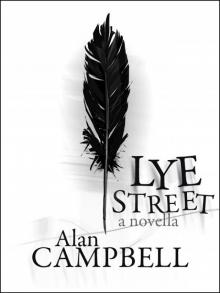 Lye Street
Lye Street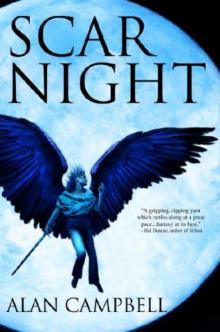 Scar Night; Book One of the Deepgate Codex Trilogy
Scar Night; Book One of the Deepgate Codex Trilogy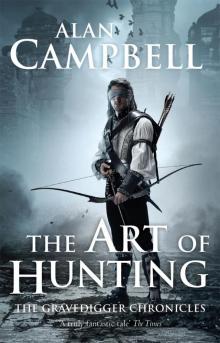 Art of Hunting
Art of Hunting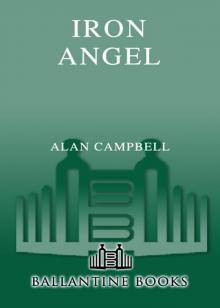 Iron Angel
Iron Angel Gravedigger 01 - Sea Of Ghosts
Gravedigger 01 - Sea Of Ghosts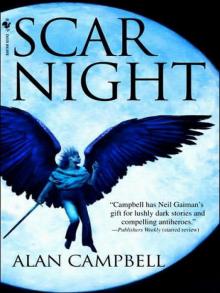 Scar Night
Scar Night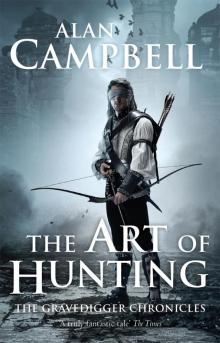 The Art of Hunting
The Art of Hunting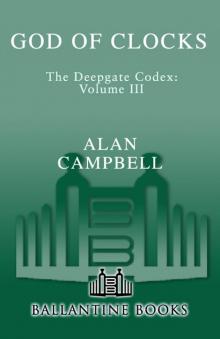 God of Clocks
God of Clocks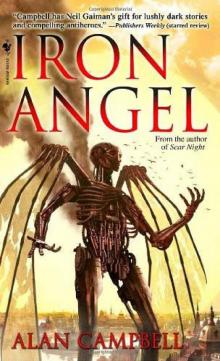 Iron Angel dc-2
Iron Angel dc-2